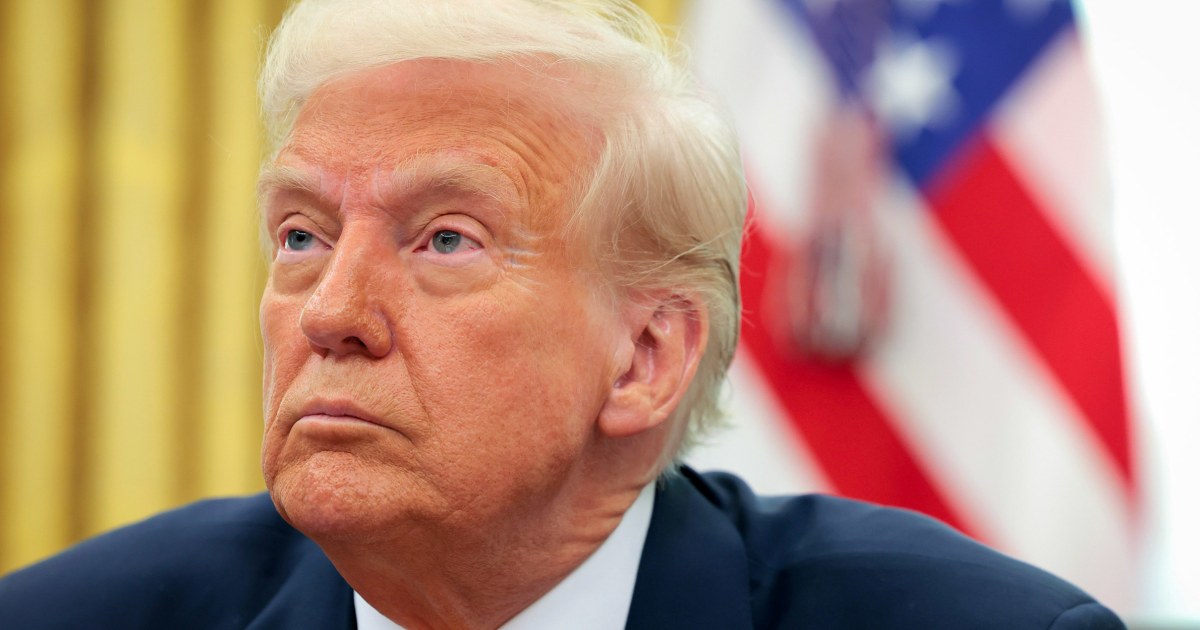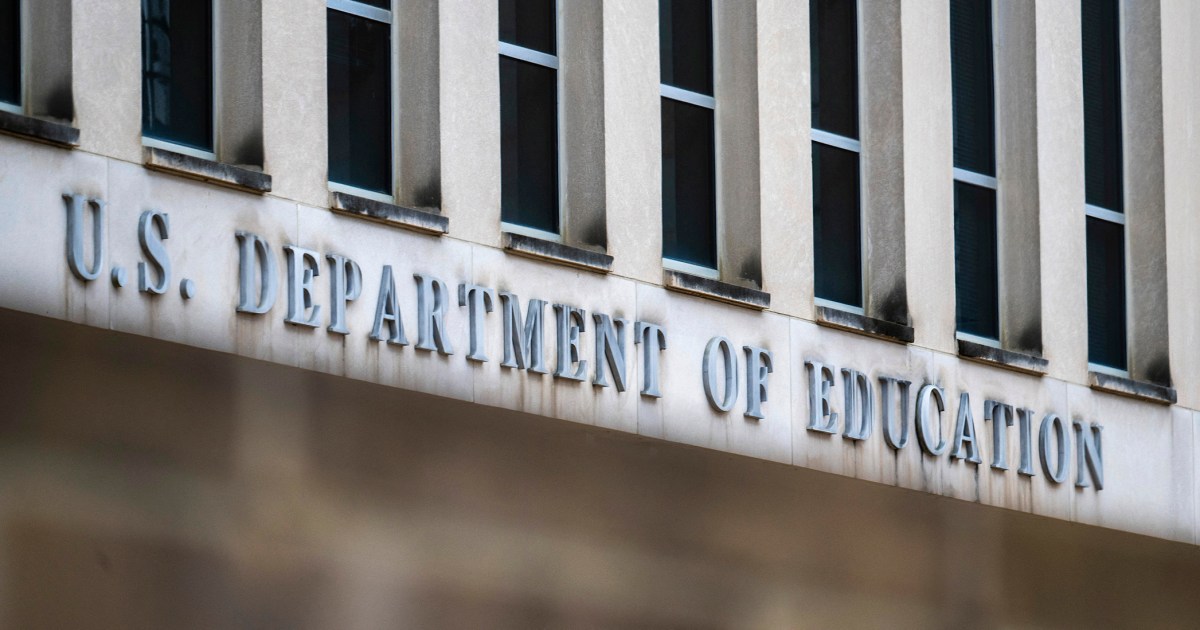Education
Trump set to sign executive order shuttering the Education Department

President Donald Trump is expected to sign an executive order Thursday to close the Education Department, fulfilling a yearslong pledge to dismantle the federal agency, the White House confirmed.
Trump will hold an event at the White House to sign the order directing Education Secretary Linda McMahon to “take all necessary steps to facilitate the closure the Department of Education and return education authority to the States, while continuing to ensure the effective and uninterrupted delivery of services, programs, and benefits on which Americans rely.”
USA Today first reported that Trump will sign the order Thursday.
Follow live politics coverage here
Formally closing the department requires an act of Congress. But even without formally shutting it down, the Trump administration could effectively make it nearly impossible for employees to carry out their work, as it has done with the U.S. Agency for International Development.
President Jimmy Carter established the department in 1979 after Congress passed the Department of Education Organization Act in bipartisan votes.
McMahon recently moved to drastically reduce the size of the Education Department by cutting its workforce in half. She called the job terminations the first step toward shutting down the department.
“That was the president’s mandate,” McMahon said last week in an interview with Fox News. “His directive to me, clearly, is to shut down the Department of Education, which we know we’ll have to work with Congress, you know, to get that accomplished.”
McMahon similarly vowed at her Senate confirmation hearing to work with Congress to advance Trump’s plan to dismantle the department. She telegraphed in an email to employees this month that major changes were coming.
“Our job is to respect the will of the American people and the President they elected, who has tasked us with accomplishing the elimination of bureaucratic bloat here at the Department of Education—a momentous final mission—quickly and responsibly,” she wrote, according to a copy obtained by NBC News.
The Senate confirmed McMahon in a 51-45 vote. No Democrat voted for her.
Trump has suggested that he could garner enough congressional support to formally close the department, characterizing teachers unions as more of a threat to the plan than lawmakers.
“I think I’d work with Congress,” Trump said last month in the Oval Office. “We’d have to work with the teachers union, because the teachers union is the only one that’s opposed to it.”
It is unclear whether Trump has secured the support of any Democratic lawmakers, many of whom have balked at his efforts on that front.
Sen. Patty Murray, D-Wash., the top Democrat on the Appropriations Committee, accused Trump and Elon Musk, the de facto head of the Department of Government Efficiency, of “robbing our students and families of critical funding.”
“The effects of Trump and Musk’s slash and burn campaign will be felt across our state—by students and families who suffer from the loss of Department staff working to ensure their rights under federal law, school districts who have to lay off teachers, students who can’t get the help they need to get financial aid, and families who get ripped off because the watchdogs were fired,” Murray said in a statement Wednesday night. “This issue is personal for me, and for every single family. We cannot relent in this fight.”
A coalition of 21 Democratic attorneys general filed a lawsuit last week arguing any attempt by Trump to eliminate the department is unlawful.
“Because neither the President nor his agencies can undo the many acts of Congress that authorize the Department, dictate its responsibilities, and appropriate funds for it to administer, the President’s directive to eliminate the Department of Education—including through the March 11 decimation of the Department’s workforce and any other agency implementation—is an unlawful violation of the separation of powers, and the Executive’s obligation to take care that the law be faithfully executed,” the lawsuit reads.
The Education Department is one of the smallest Cabinet-level departments. Its $268 billion appropriations last year represented 4% of the U.S. budget.
The department does not dictate curricula used in classrooms. It is largely a funding and civil rights enforcement organization, distributing money for schools with high rates of impoverished students and to assist children with disabilities.
It also runs the public student loan program, which has more consumer protections and lower interest rates than private education loan programs.
Trump’s executive order will direct McMahon to ensure the agency’s funds do not go toward programs or activities that advance diversity, equity and inclusion goals or gender ideology.
The Education Department last week announced investigations into more than 50 universities it accused of “engaging in race-exclusionary practices in their graduate programs.”
Diversity, equity and inclusion, or DEI, is a widely used label applied to efforts to improve workplace culture and create more opportunities for disadvantaged groups, and they are not inherently discriminatory.
National Education Association President Becky Pringle said in a statement Wednesday that Trump’s effort to close the Education Department could have disastrous implications for students across the country.
“If successful, Trump’s continued actions will hurt all students by sending class sizes soaring, cutting job training programs, making higher education more expensive and out of reach for middle class families, taking away special education services for students with disabilities, and gutting student civil rights protections,” Pringle said in a statement.
She accused Trump and Musk of aiming “their wrecking ball at public schools and the futures of the 50 million students in rural, suburban, and urban communities across America to pay for tax handouts for billionaires.”
McMahon said last week that at least three DOGE staffers had been auditing the Education Department.
Keri Rodrigues, the president of the National Parents Union, said dismantling the department would disproportionately affect the most vulnerable communities.
“Let’s be clear: Before federal oversight, millions of children—particularly those with disabilities and those from our most vulnerable communities—were denied the opportunities they deserved,” Rodrigues said in a statement Wednesday night. “The Department of Education was created to ensure that every child, regardless of background or zip code, has access to a public education that prepares them for their future. Eliminating it would roll back decades of progress, leaving countless children behind in an education system that has historically failed the most marginalized.”
Trump has long pledged to dismantle the Education Department, first mentioning the idea during his previous term and campaigning on the promise extensively throughout the 2024 election. He has suggested that states should take over administering educational policy and that other parts of the federal government could absorb current agency responsibilities, like overseeing federal student loans.
“Your state is going to control your children’s education. We’re moving it out of Washington immediately,” Trump said at a campaign event last year in Saginaw, Michigan. “We’re going to do that very fast, and it’s going to be great.”
Education
Trump admin threatens to stop Harvard from enrolling foreign students

The Trump administration is continuing its battle against Harvard University — this time, canceling $2.7 million in grants and threatening to stop the enrollment of international students.
Homeland Security Secretary Kristi Noem on Wednesday announced the cancellation of two DHS grants to the school, declaring it “unfit to be entrusted with taxpayer dollars.”
Noem also said she sent a letter to Harvard demanding “detailed records” on foreign student visa holders’ “illegal and violent activities” by April 30.
If Harvard does not meet that deadline, it’ll immediately lose its Student and Exchange Visitor Program certification, she warned.
The release alleged Harvard’s foreign visa holders participated in riots and spewed antisemitic hate targeting Jewish students following the Hamas incursion against Israel on Oct. 7, 2023.
“If Harvard cannot verify it is in full compliance with its reporting requirements, the university will lose the privilege of enrolling foreign students,” a DHS news release said.
The two canceled grants were: an $800,303 grant for Implementation Science for Targeted Violence Prevention, which Noem said “branded conservatives as far-right dissidents in a shockingly skewed study,” and a $1.9 million Blue Campaign Program Evaluation and Violence Advisement grant that Noem alleged “funded Harvard’s public health propaganda.”
“Harvard bending the knee to antisemitism — driven by its spineless leadership — fuels a cesspool of extremist riots and threatens our national security,” Noem said in a statement. “With anti-American, pro-Hamas ideology poisoning its campus and classrooms, Harvard’s position as a top institution of higher learning is a distant memory. America demands more from universities entrusted with taxpayer dollars.”
It’s the latest punch by the Trump administration against the nation’s most prestigious university.
Earlier this week, the Trump administration announced that it would freeze more than $2 billion in grants to Harvard after the institution refused to accept demands that included auditing the viewpoints of its student body. Trump has also called for Harvard to lose its tax-exempt status.
On Monday, Harvard University’s lawyers sent a letter rejecting a list of demands from the Trump administration. In a statement posted online, Harvard President Alan Garber referred to the demands as “an attempt to control the Harvard community” and vowed to fight back.
A Harvard spokesperson told NBC News on Thursday that the school will “not surrender its independence or relinquish its constitutional rights,” while complying with the law.
Education
NAACP sues U.S. Education Department over DEI school funding cuts

The NAACP sued the U.S. Department of Education on Tuesday to stop its alleged illegal effort to cut off funding to schools that use diversity, equity and inclusion programs, and prevent Black students from receiving equal education opportunities.
In a complaint filed in Washington, D.C., the largest U.S. civil rights group faulted the Trump administration for targeting programs that offer “truthful, inclusive curricula,” policies to give Black Americans equal access to selective education opportunities, and efforts to foster a sense of belonging and address racism.
It also said the policies “advance a misinterpretation” of federal civil rights laws and Supreme Court precedent that undermine NAACP members’ equal protection rights and protections from viewpoint discrimination under the U.S. Constitution.
The Education Department did not immediately respond to requests for comment on the federal lawsuit.
U.S. President Donald Trump has made ending racial preferences and so-called DEI programs a top priority in his second White House term.
The Education Department had on February 14 sent a “Dear Colleague” letter to schools receiving federal funding.
That letter said federal law prevented the schools from considering race as a factor in areas such as admissions, hiring and promotion, pay, financial aid, scholarships and prizes, housing and graduation ceremonies.
Then on April 3, the department demanded certifications of compliance from schools, including an end to DEI programs.
It said this was required by Title VI of the Civil Rights Act of 1964, which bars recipients from allowing discrimination based on race, and a 2023 Supreme Court decision involving Harvard University that effectively ended race-conscious admissions in higher education.
While the department agreed in a separate lawsuit in New Hampshire not to enforce the “Dear Colleague” letter until April 24, the NAACP said some schools have lost funding while others have flinched and canceled programs.
It cited the Waterloo, Iowa, school district’s withdrawal of first-grade students from the University of Northern Iowa’s annual African American Read-In, which nearly 3,500 students at 73 schools attended.
NAACP President Derrick Johnson accused the White House of “effectively sanctioning” discrimination that U.S. civil rights laws were designed to prevent.
“Children of color consistently attend segregated, chronically underfunded schools where they receive less educational opportunities and more discipline,” Johnson said. “Denying these truths doesn’t make them disappear — it deepens the harm.”
The case is NAACP v U.S. Department of Education et al, U.S. District Court, District of Columbia, No. 25-01120.
Education
Many HBCUs need government funding but some are preparing for a future without it

Colleges across the country are facing battles with the federal government over funding, but similar cuts and the potential elimination of the Education Department may be existential for historically Black colleges and universities, according to at least six college administrators and leaders who spoke with NBC News.
Florida Agricultural and Mechanical University’s (FAMU) college of pharmacy lost a $16.3 million federal grant in late March, as the Trump administration has threatened cuts at American colleges over diversity, equity and inclusion on campus. The moves are causing several Black colleges to consider what their budgets may look like with less or no federal funding.
“We’re at this position where we realize that our ancestors did not rely on federal money in order to get the work done,” said Fatima Brunson, an assistant professor for education at Spelman College, a private women’s HBCU in Atlanta with about 2,600 students.
Still, for the 100 or so HBCUs in the country — some of which were underfunded by more than $12 billion over the last 30 years compared with non-HBCUs, according to a 2022 Forbes analysis — federal cuts may translate to staff cuts, fewer students and the elimination of certain programs, according to two HBCU administrators who spoke to NBC News on the condition of anonymity because they were not authorized to speak on behalf of their universities.
One of the HBCU leaders described a shared “culture of concern” across Black colleges.
“Students and others at these institutions are getting a steady and really unmistakable message that they are the enemies of the Trump administration at all levels,” the HBCU leader said. “If there is a hiccup there, then we are going to get a stomach ulcer.”
Fifty-four percent of Black colleges’ total revenue depends on federal and state funds, compared with just one-third for other colleges and universities, making them “susceptible to economic downturns, state divestments from higher education, or policy changes,” the authors of a 2019 report by the United Negro College Fund wrote.
The dilemma has fueled angst at these institutions — where, on average, 3 in 4 students also receive need-based federal aid — about who will have access to financial resources and benefits and who won’t. Seventy-three percent of HBCU students receive Pell Grants, the low-income federal student aid program, which were traditionally issued by the Education Department, compared with 36% of non-HBCU students, according to the United Negro College Fund.
The White House did not respond to a request for comment. Madi Biedermann, the Education Department’s deputy assistant secretary for communications, said the department will not be shutting down immediately, and that federally mandated programs have not been moved out of the Education Department as of now.
“As President Trump and Secretary McMahon have made clear, sunsetting the Department of Education will be done in partnership with Congress and national and state leaders to ensure all statutorily required programs are managed responsibly and where they best serve students and families,” Biedermann said in a statement to NBC News on Wednesday.
Valerie Kinloch, who became president of Johnson C. Smith University in Charlotte, North Carolina, less than two years ago, expected challenges in her position. She did not anticipate having to weather the eventual dismantling of the Education Department or preparing to reimagine university life without federal funds.
“And yet,” she said, “we are.”
Kinloch’s predicament mirrors what many Black colleges and universities are experiencing as they brace for potential staffing cuts and reduced student enrollment as the Education Department heads toward being shuttered by the Trump administration.
To make up for a potential shortfall, her university launched a $10 million fundraising initiative to match the amount of federal aid it receives.
Kinloch noted that while some financial responsibilities for colleges also fall to states, she is concerned about the future of federal programs like Upward Bound, which helps first-generation college students and is backed by the Education Department.
Grant funding for critical health and science research, including several ongoing projects that address housing and health care inequalities “that can transform lives,” she said, may also be in danger due to cuts.
Black colleges contribute roughly $15 billion to their local economies in addition to tens of thousands of jobs, according to the Thurgood Marshall College Fund.
For example, FAMU’s lost $16.3 million federal grant supported new faculty hires and funded research into artificial intelligence and cancer biology, including colorectal cancer disparities in Black Americans. The school is now appealing the decision to the National Institutes of Health, an agency under the Department of Health and Human Services.
No further cuts have come down yet, but Charles Weatherford, vice president for research at FAMU, said that “the loss of funding from the Department of Education could potentially impact funds that have been used to support graduate students and academic departmental innovation. Less funding opportunities would impact the types of financial support available to students to further their higher education aspirations.”
With cuts, new federal restrictions and confusion looming over colleges, some HBCU leaders say their colleges are exploring what life without government funding would look like — while acknowledging that not every campus has that privilege.
More than 300,000 students attend about 100 accredited HBCUs across 19 states, according to the National Center for Education Statistics.
North Carolina A&T, the biggest HBCU, has the largest endowment of all Black public colleges, with $202 million in its coffers. Howard University, a private school in Washington, D.C., recently became the first Black college to have a $1 billion endowment.
“As an institution and HBCU, Spelman College has positioned themselves to feel pretty confident that we’re OK,” said Spelman’s Brunson. “But it’s not the same” for each HBCU.
Eighteen Black colleges, including Howard, were among the 30 most reliant on federal funds for their operating revenues, according to 2023 federal education data.
Hassiem Kambui, an education professor at a public HBCU and author of “Africentric Education: Public Schools Versus Charter Schools,” said he sees this time of evolution for Black colleges as a moment to reinvest in self-preservation.
“This is an opportunity to look at ourselves as educators and evaluate how we are moving on education, focusing on change and the lessons we can learn associated with how American students are served given those allocated funds,” Kambui said.
President Donald Trump has threatened to pull federal funding from colleges that don’t rid their curriculums and offices of DEI-related materials and practices, even investigating 45 universities that have partnered with The PhD Project, which aims to diversify faculties at business schools. While no HBCUs are among those listed, HBCU leaders anticipate that it’s only a matter of time.
By banning DEI practices in the federal government and putting pressure on private companies to do the same, Trump has prophesied, “Our country will be woke no longer.” This comes as HBCUs are experiencing record enrollment numbers following the Supreme Court’s 2023 decision to strike down affirmative action programs and race-based admissions at predominantly white institutions.
In February, the U.S. Department of Agriculture briefly suspended its 1890 scholars program, an initiative at 19 HBCUs that covers the full tuition of selected agricultural studies students. The program was restored four days later, and the federal government did not explain why it had been initially suspended.
Many HBCU leaders see consistent roadblocks for Black schools as evidence of a coordinated strategy at the highest levels of the country to undermine their existence.
Brunson, said she sees this moment as an opportunity to reset.
“Education is under attack and it’s just something that we’re kind of in the trenches with,” she said. “If anything, it’s making us go back to the deeper philosophical reason for why we are here in the first place.”
-

 Europe2 days ago
Europe2 days agoCody Balmer, the suspect in arson at Pennsylvania governor’s home targeted the governor for his views on war in Gaza, warrant says
-

 Education2 days ago
Education2 days agoTrump administration revokes humanitarian parole of Spanish teacher
-

 Conflict Zones2 days ago
Conflict Zones2 days agoAfter two years of war in Sudan, the world can no longer plead ignorance | Conflict
-

 Conflict Zones17 hours ago
Conflict Zones17 hours agoHaiti in ‘free fall’ as violence escalates, rights group warns | Armed Groups News
-

 Sports2 days ago
Sports2 days agoStephen Curry and Jimmy Butler lift the Warriors past the Grizzlies and into the NBA Playoffs
-

 Sports2 days ago
Sports2 days agoNew Orleans Saints win lawsuit over fleur-de-lis trademark filed by ‘direct descendant of the Kings of France’
-

 Africa2 days ago
Africa2 days agoWorld Trade Organization says global trade could slide this year due to tariffs
-

 Africa2 days ago
Africa2 days agoSudan: Rapid Support Forces leader announces rival government




